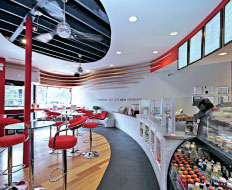After holding various positions in the Darden enterprise and managing a Chicago-area Panera Bread, Ed O’Brien tired of working for others. Eager to become his own boss, O’Brien opened Bountiful Eatery in July 2012.
Sandwiched between an ice cream shop and a pizza parlor, the Chicago-based restaurant offers a gluten-free menu of pita wraps filled with fresh produce, as well as an assortment of soups, stews, and chili made with seasonal ingredients.
In addition to its gluten-free niche, O’Brien has promoted Bountiful Eatery as an event destination, with the restaurant hosting everything from fundraisers and tastings to kids’ cookie decorating parties and healthy-living seminars. On the final Saturday of each month, the restaurant gets romantic with candlelight, tablecloths, and table service for its reservation-only date nights.
O’Brien discusses the inspiration for his fast-casual restaurant, its early success, and future prospects.
What inspired you to open Bountiful Eatery?
I’m gluten intolerant myself and know what a struggle it can be to find a quick meal. With gluten-free, I saw a niche that wasn’t being filled, specifically when paired with fresh and healthy.
What gave you the confidence that a gluten-free restaurant would work?
I tried to minimize risk by doing my homework. Walking around the Lakeview neighborhood [in Chicago], I studied restaurants that were full and those that weren’t. I noticed that the generalists weren’t ruling today as they once did and that those restaurants with a clearly defined niche seemed to attract the most traffic.
Some people consider gluten-free a trend, but I see it as a new industry. Big players like Sysco and Gordon Food Service are all promoting gluten-free lines, and grocery stores have gone from a few shelves of gluten-free items to entire aisles. Those developments were promising.
What has fueled the restaurant’s early success?
I know we have to successfully deliver every time, so that’s been the primary focus. Fortunately, our customers are seeing that, so much so that some days can be overwhelming. The people who appreciate us really appreciate us.
Beyond that, we understand our limitations—even turning down a massive community event because I knew we couldn’t possibly produce that much food. I’ve tried to clearly stick to who we are and what we can accomplish.
What are your hopes for the future?
Since the beginning, I’ve envisioned this as a multiunit concept, and I’m now in talks about a suburban location, as well as one in downtown Chicago. Five years down the road, I hope we might have about 25 units and begin franchising thereafter.







